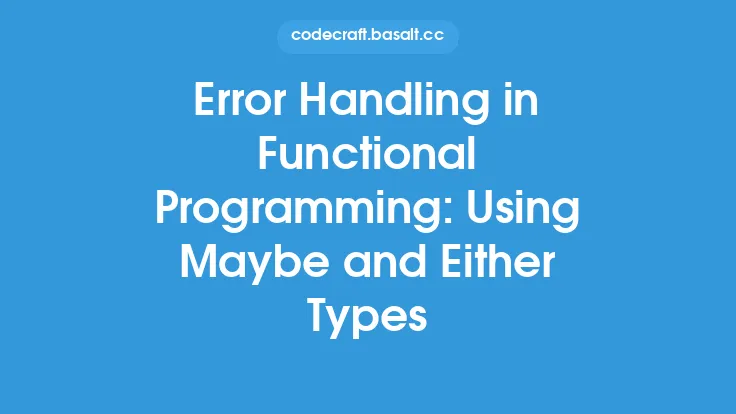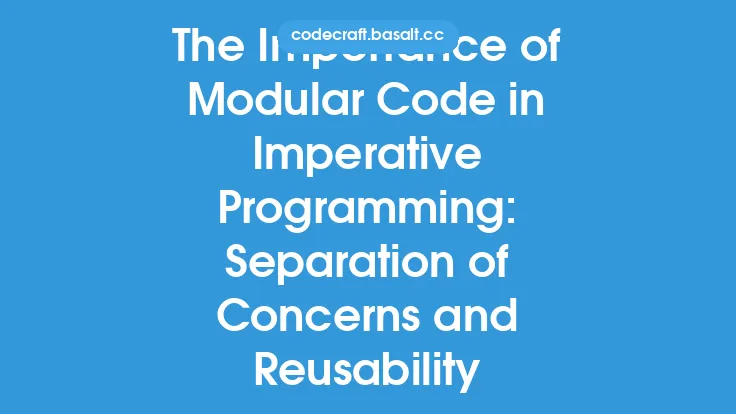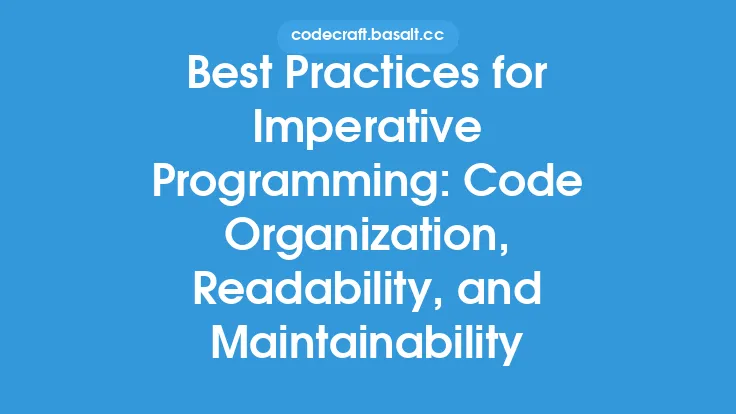Imperative programming, a paradigm that focuses on describing how to perform tasks, relies heavily on the use of statements that change the program's state. This approach, while effective for a wide range of applications, introduces complexities that can lead to errors. Error handling and debugging are crucial aspects of imperative programming, ensuring that programs behave as expected, recover from unexpected conditions, and provide meaningful feedback when errors occur. This article delves into the strategies and techniques for effective error handling and debugging in imperative programming, providing developers with the tools to write robust, reliable, and maintainable code.
Understanding Errors in Imperative Programming
Errors in imperative programming can arise from various sources, including syntax errors, runtime errors, and logical errors. Syntax errors occur when the code violates the programming language's syntax rules, preventing the code from compiling or interpreting correctly. Runtime errors happen during the execution of the program, often due to conditions such as division by zero, out-of-range values, or attempting to access non-existent resources. Logical errors, the most challenging to identify, result from flaws in the program's logic, leading to unexpected behavior or incorrect results. Understanding the nature of these errors is the first step in developing effective error handling and debugging strategies.
Error Handling Strategies
Error handling in imperative programming involves anticipating potential errors, catching them when they occur, and taking appropriate actions to recover or provide useful feedback. Several strategies are employed to handle errors effectively:
- Try-Catch Blocks: Many programming languages support try-catch blocks, which allow developers to enclose code that might throw an exception within a try block and handle the exception in a corresponding catch block. This mechanism enables graceful error recovery and prevents program crashes.
- Error Codes: Returning error codes from functions or procedures is another common approach. This method requires the caller to check the return value and handle the error accordingly. While straightforward, it can lead to cluttered code if not managed properly.
- Assertions: Assertions are statements that verify the truth of a condition. If the condition is false, the program terminates and reports an error. Assertions are useful for detecting logical errors during development but should be disabled in production code to avoid unnecessary overhead.
Debugging Techniques
Debugging is the process of identifying and fixing errors in the code. Imperative programming languages offer various debugging techniques and tools to facilitate this process:
- Print Statements: Inserting print statements at strategic points in the code can help trace the program's execution flow and variable values. Although simple, this method can be effective for small programs or when more sophisticated tools are not available.
- Debuggers: Most modern programming environments come with integrated debuggers or support third-party debugging tools. These tools allow developers to step through the code line by line, inspect variables, set breakpoints, and examine the call stack, making it easier to pinpoint and understand errors.
- Logging: Implementing logging mechanisms in the code can provide valuable insights into the program's behavior over time. Logs can record important events, errors, and variable states, aiding in the diagnosis of issues that may not be immediately apparent.
Best Practices for Error Handling and Debugging
Adhering to best practices can significantly improve the effectiveness of error handling and debugging in imperative programming:
- Be Proactive: Anticipate potential errors and implement error handling mechanisms from the outset. This proactive approach saves time and effort in the long run.
- Keep it Simple: Simple error handling code is easier to understand and maintain. Avoid complex error handling logic that might introduce new errors.
- Test Thoroughly: Comprehensive testing is crucial for identifying and fixing errors. This includes unit testing, integration testing, and user acceptance testing.
- Document Errors: Maintain detailed documentation of errors, including their causes, symptoms, and solutions. This knowledge base is invaluable for future reference and can help in preventing similar errors.
Advanced Error Handling and Debugging Concepts
For complex imperative programming projects, advanced error handling and debugging techniques may be necessary:
- Exception Handling Hierarchies: Organizing exceptions into hierarchies allows for more precise error handling. Base exceptions can be caught and handled at higher levels, while specific exceptions are handled at lower levels.
- Aspect-Oriented Programming: This paradigm focuses on separating cross-cutting concerns, such as error handling and logging, from the main program logic. Aspect-oriented programming can lead to cleaner, more modular code.
- Post-Mortem Debugging: In situations where a program crashes or terminates unexpectedly, post-mortem debugging techniques can be used to analyze the program's state at the time of failure. This often involves examining core dumps or memory snapshots.
Conclusion
Error handling and debugging are essential skills for imperative programmers, ensuring the reliability, stability, and performance of their applications. By understanding the types of errors that can occur, employing effective error handling strategies, and utilizing various debugging techniques, developers can significantly improve the quality of their code. Adhering to best practices and exploring advanced concepts can further enhance error handling and debugging capabilities, leading to more efficient and maintainable software development processes. As imperative programming continues to evolve, the importance of robust error handling and debugging practices will only continue to grow, underlining their critical role in the development of dependable and efficient software systems.





